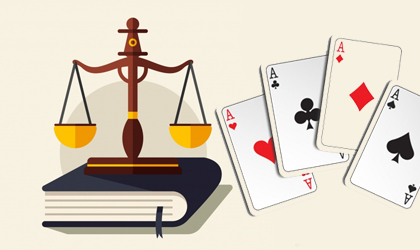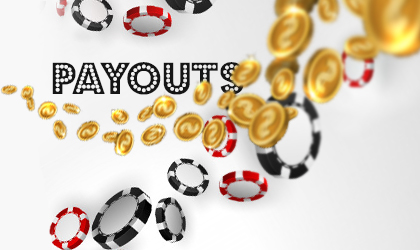Caribbean Stud Poker Rules

12:49 Jul 20th, 2018 Games Online Gambling , Poker
Rules to Caribbean Stud Poker and How to play Caribbean Stud
Poker Game Rules
 The play -- Caribbean Stud Poker. Caribbean Stud Poker is the copyrighted, trademarked, and patented poker variation game, the rights to which on June 1, 1999 were owned by Mikohn Gaming Corporation of Las Vegas, Nevada and which may be transferred or assigned. Caribbean Stud Poker rules:
The play -- Caribbean Stud Poker. Caribbean Stud Poker is the copyrighted, trademarked, and patented poker variation game, the rights to which on June 1, 1999 were owned by Mikohn Gaming Corporation of Las Vegas, Nevada and which may be transferred or assigned. Caribbean Stud Poker rules:
Caribbean Stud Poker may be played only on approved tables equipped with the necessary electronic equipment and signage, and which displays the Caribbean Stud Poker table layout. A single deck of cards will be used. Players do not play against other players. Each player may play only one hand following each shuffle of the deck.
Each player must make an ante wager by placing the wager in the designated “ante” wagering area in front of the player’s position. The ante wager may not exceed two dollars and fifty cents.
Each player may place an additional, optional wager by placing a token in the designated coin-in slot in front of the player’s ante.
The optional wager will allow the player to participate in play for a progressive jackpot. As tokens are accepted, the progressive meter will advance by a predetermined amount for each token placed through the coin-in slots. A player wins a progressive jackpot award if the player has made the optional wager and holds a hand having a value of flush or better. Multiple Caribbean Stud Poker games and/or Caribbean Draw poker games may be linked together with a common progressive jackpot.
In the event that two or more players qualified to receive progressive jackpot payments hold royal flushes in the same hand, the royal flush progressive jackpot may be divided equally between or among the qualified players.
After all progressive wagers have been made and before the dealer starts to deal the cards, the dealer operates a keypad by which the dealer locks out the coin-in mechanism. After the hand is completed, the dealer will clear the lockout so the players may wager on the progressive jackpot for the next hand.
As the terms “jackpot,” “jackpot award,” and “progressive jackpot” are used in these rules of play for Caribbean Stud, the terms shall apply to Caribbean Stud only. A retail licensee may not discontinue offering a Caribbean Stud jackpot until the highest progressive jackpot award has been won by a qualified player or players. If a licensee wishes to discontinue offering a progressive jackpot award, the licensee may petition the Director for permission to either reduce the qualifications or criteria for winning the award, allowing the award to be paid more quickly, or to transfer the award liability to the jackpot offered by a different game. If a retail licensee intends to close its business while having a progressive jackpot award liability, the licensee may petition the Director for permission to transfer the award liability, together with the award fund, to another retail licensee offering a comparable jackpot award.
Any dealer tip delivered as a wager shall be placed on the “ante” only, and may not exceed the value of the player’s ante. The dealer may not accept a tip wager on the “bet” area.
Immediately prior to the commencement of play and after each round of play has been completed, the dealer shall shuffle the cards. Following shuffle and cut, the dealer deals five cards to each player and to the dealer, either face downward and one at a time in clockwise rotation among the players and the dealer, or in a five card group dispensed by a mechanical shuffling device. The fifth card dealt to the dealer only, which shall be the bottom card of the group of cards dispensed by the shuffling device, shall be dealt or turned face up. The first player to receive a card, or cards, is the player to the left of the dealer; the dealer receives cards last. After all cards have been dealt, the dealer shall place the remaining cards into the discard rack without exposing the cards.
 An incorrect number of cards dealt to any player constitutes a dead hand for that player only. The player receiving the misdealt cards retains the player’s ante and any bet. An incorrect number of cards dealt to the dealer constitutes a misdeal to the table and the players may play their hands for the purposes of the progressive jackpot only. If there are no progressive jackpot hands, all hands at the table are dead and the players retain their antes and bets.
An incorrect number of cards dealt to any player constitutes a dead hand for that player only. The player receiving the misdealt cards retains the player’s ante and any bet. An incorrect number of cards dealt to the dealer constitutes a misdeal to the table and the players may play their hands for the purposes of the progressive jackpot only. If there are no progressive jackpot hands, all hands at the table are dead and the players retain their antes and bets.
The player now picks up the player’s cards and must decide either to fold (surrender ante) or to bet (bet equals two times ante). (a) If the player folds, the ante wager is lost. In any player order, the dealer collects first the ante and then the cards from each player who has folded. As the cards are collected, the dealer will spread them, count them, and then place them in the discard rack. (b) If the player wishes to play the hand, the player must make an additional wager, equal to exactly twice the amount of the ante, by placing the wager in the “bet” area, behind the ante, in front of the player’s position.
The dealer turns over the dealer’s remaining cards and creates the best possible poker hand. The dealer must have a hand consisting of an ace and a king, or better, to have a qualifying hand. If the hand is qualifying, the dealer moves the poker hand forward allowing the players to see the hand. (9) If the dealer does not have a qualifying hand, the dealer will announce “no hand” and immediately pay all the ante wagers at the rate of 1 to 1 (even money).
The dealer will then spread, count, and collect each player’s cards individually. The cards of players who have a hand qualifying for a progressive jackpot payment will be left on the table face up.
A games supervisor will verify the hands, if any, which qualify for a progressive jackpot payout, will announce the amount, and will pay the player.
When all player wagers have been made, the dealer will compare the dealer’s hand to the hand of each player who has made both “ante” and “bet” wagers. The higher poker hand, between each player and the dealer, wins.
Payouts
 Tied hands result in a push and no action.
Tied hands result in a push and no action.- The antes of winning hands are paid at the rate of 1 to 1 (even money).
- The bets of winning players’ hands are paid according to the following payment schedule, which shall be displayed by table signage or on the table layout:
- Royal flush pays 100 to 1
- Straight flush pays 50 to 1
- Four of a kind pays 20 to 1
- Full house pays 7 to 1
- Flush pays 5 to 1
- Straight pays 4 to 1
- Three of a kind pays 3 to 1
- 2 pairs pays 2 to 1
- 1 pair or less pays 1 to 1 (even money)
Results
The dealer compares hands, pays winning wagers, and takes losing wagers, beginning with the player to the dealer’s right and moving counterclockwise around the table.
After paying or taking each wager, the dealer must spread the player’s cards, count them, and place them in the discard rack before the dealer moves on to the next player. The cards of players who have a hand qualifying for a progressive jackpot payment will be left on the table face up.
A games supervisor will verify the hands, if any, which qualify for a progressive jackpot payout, will announce the amount, and will pay the player. The player’s card will then be collected and placed in the discard rack.
Player hands qualifying for progressive jackpot payments shall be paid according to the following payment schedule, which shall be displayed by table signage or on the table layout:
- Royal flush pays 100% of the displayed progressive jackpot;
- Straight flush pays either 10% of the displayed progressive jackpot or pays $5,000 (licensee chooses payout option at the time the game is put into play);
- Four of a kind pays $500
- Full house pays $100
- Flush pays $50
On This Page



